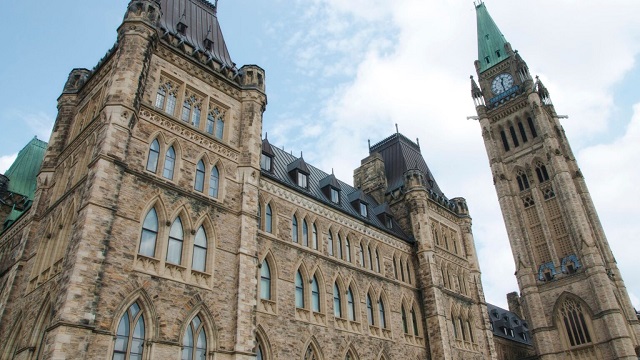Economy
The 15-Minute City: An extraordinarily bad idea

From the Frontier Centre for Public Policy
” the average resident of the New York urban area—the closest thing to a 15-minute city in the U.S. or Canada—can reach at least 21 times as many jobs in a 20-minute auto drive as in a 20-minute walk. The same will be true of other economic opportunities. “
The latest urban planning fad to sweep across Canada is the 15-minute city, which proposes to redesign cities so that all urban residents live within an easy, 15-minute walk of schools, retailers, restaurants, entertainment, and other essentials of modern life. This is supposed to simultaneously reduce greenhouse gas emissions while it increases our quality of life.
Some think it is a conspiracy. Others insist it is not. Conspiracy or not, the only way to have true 15-minute cities would be to drastically change Canadian lifestyles.
Fifteen-minute cities mean a lot more people living in multifamily housing and fewer in single-family housing. It means most food shopping would be done in high-priced, limited-selection grocery stores. There is no way that Costcos or even large supermarkets can fit into 15-minute cities; to survive, these stores need a lot more customers than could live within a 15-minute walk from their front doors.
Most of the benefits claimed for 15-minute cities are wrong. Proponents claim they would be more affordable, but high-density, multi-story housing costs two to five times as much, per square foot, as single-family homes. Packing people into four- and five-story apartment buildings would require cutting average dwelling sizes at least in half to make them anywhere close to affordable.
Proponents also claim 15-minute cities would save energy and reduce greenhouse gases and other pollutants. But let’s be honest: people aren’t going to give up their cars or stop going to Costco.
Admittedly, the U.S. Department of Energy says that people living in high-density cities do drive a little less than people in low-density areas. But it also says that there is a lot more congestion in high-density cities. Since cars use more energy in slower traffic, high-density cities use more energy (and therefore emit more greenhouse gases) per capita than low-density areas.
Proponents also claim that 15-minute cities will be more equitable. Yet, before about 1890, most Canadian cities were 15-minute cities. Most people in these cities lived in crushing poverty and there were huge disparities between the rich and the poor, with only a small middle-class in between.
What changed these cities was the mass-produced automobile. The Model T Ford democratized mobility, allowing more people to escape the dense cities to find better housing, better jobs, access to lower-cost consumer goods, and a wider range of social and recreation opportunities.
The University of Minnesota Accessibility Observatory calculates that the average resident of the New York urban area—the closest thing to a 15-minute city in the U.S. or Canada—can reach at least 21 times as many jobs in a 20-minute auto drive as in a 20-minute walk. The same will be true of other economic opportunities. Eliminating the automobile, which is the goal of the 15-minute city, would eliminate those economic benefits.
We had this same debate 50-some years ago when urban skies were polluted with carbon monoxide, smog, and other toxic automobile emissions. Some people advocated policies that would force people to drive less. Others advocated new technologies that would reduce the air pollution coming from autos and trucks.
Today, total automotive air pollution has been reduced by about 90 percent. All this improvement came from cleaner cars: new cars today pollute only about 1 percent as much as cars made in 1970. None of this improvement came from anti-automobile policies, as Canadians drive far more miles today than they did 50 years ago.
If anything, policies aimed at reducing driving made pollution worse as one of those policies was to increase traffic congestion to get people out of their cars. Yet, as noted above, cars actually pollute more in congested traffic.
Anti-automobile policies today, including 15-minute cities, spending billions on rail transit lines that carry only a small percentage of urban travel, and converting general street lanes into exclusive bike lanes, are going to have the same effect.
People who care about the planet should demand policies that actually work and not ones that are based on urban planning fantasies and fads. Instead of attempting to drastically change Canadian lifestyles, that means making cars that are cleaner and more fuel-efficient so that the driving we do has a lower environmental impact. The 15-minute city may not be a conspiracy, but it is still an extraordinarily bad idea.
Randal O’Toole is a transportation policy analyst and author of Building 21 st Century Transit Systems for Canadian Cities, an upcoming report published by the Frontier Centre for Public Policy.
Watch Randal on Leaders on the Frontier here.
Business
Maxime Bernier warns Canadians of Trudeau’s plan to implement WEF global tax regime

From LifeSiteNews
If ‘the idea of a global corporate tax becomes normalized, we may eventually see other agreements to impose other taxes, on carbon, airfare, or who knows what.’
People’s Party of Canada leader Maxime Bernier has warned that the Liberal government’s push for World Economic Forum (WEF) “Global Tax” scheme should concern Canadians.
According to Canada’s 2024 Budget, Prime Minister Justin Trudeau is working to pass the WEF’s Global Minimum Tax Act which will mandate that multinational companies pay a minimum tax rate of 15 percent.
“Canadians should be very concerned, for several reasons,” People’s Party leader Maxime Bernier told LifeSiteNews, in response to the proposal.
“First, the WEF is a globalist institution that actively campaigns for the establishment of a world government and for the adoption of socialist, authoritarian, and reactionary anti-growth policies across the world,” he explained. “Any proposal they make is very likely not in the interest of Canadians.”
“Second, this minimum tax on multinationals is a way to insidiously build support for a global harmonized tax regime that will lower tax competition between countries, and therefore ensure that taxes can stay higher everywhere,” he continued.
“Canada reaffirms its commitment to Pillar One and will continue to work diligently to finalize a multilateral treaty and bring the new system into effect as soon as a critical mass of countries is willing,” the budget stated.
“However, in view of consecutive delays internationally in implementing the multilateral treaty, Canada cannot continue to wait before taking action,” it continued.
The Trudeau government also announced it would be implementing “Pillar Two,” which aims to establish a global minimum corporate tax rate.
“Pillar Two of the plan is a global minimum tax regime to ensure that large multinational corporations are subject to a minimum effective tax rate of 15 per cent on their profits wherever they do business,” the Liberals explained.
“The federal government is moving ahead with legislation to implement the regime in Canada, following consultations last summer on draft legislative proposals for the new Global Minimum Tax Act,” it continued.
According to the budget, Trudeau promised to introduce the new legislation in Parliament soon.
The global tax was first proposed by Secretary-General of Amnesty International at the WEF meeting in Davos this January.
“Let’s start taxing carbon…[but] not just carbon tax,” the head of Amnesty International, Agnes Callamard, said during a panel discussion.
According to the WEF, the tax, proposed by the Organization for Economic Co-operation and Development (OECD), “imposes a minimum effective rate of 15% on corporate profits.”
Following the meeting, 140 countries, including Canada, pledged to impose the tax.
While a tax on large corporations does not necessarily sound unethical, implementing a global tax appears to be just the first step in the WEF’s globalization plan by undermining the sovereignty of nations.
While Bernier explained that multinationals should pay taxes, he argued it is the role of each country to determine what those taxes are.
“The logic of pressuring countries with low taxes to raise them is that it lessens fiscal competition and makes it then less costly and easier for countries with higher taxes to keep them high,” he said.
Bernier pointed out that competition is good since it “forces everyone to get better and more efficient.”
“In the end, we all end up paying for taxes, even those paid by multinationals, as it causes them to raise prices and transfer the cost of taxes to consumers,” he warned.
Bernier further explained that the new tax could be a first step “toward the implementation of global taxes by the United Nations or some of its agencies, with the cooperation of globalist governments like Trudeau’s willing to cede our sovereignty to these international organizations.”
“Just like ‘temporary taxes’ (like the income tax adopted during WWI) tend to become permanent, ‘minimum taxes’ tend to be raised,” he warned. “And if the idea of a global corporate tax becomes normalized, we may eventually see other agreements to impose other taxes, on carbon, airfare, or who knows what.”
Trudeau’s involvement in the WEF’s plan should not be surprising considering his current environmental goals – which are in lockstep with the United Nations’ 2030 Agenda for Sustainable Development – which include the phasing out coal-fired power plants, reducing fertilizer usage, and curbing natural gas use over the coming decades.
The reduction and eventual elimination of so-called “fossil fuels” and a transition to unreliable “green” energy has also been pushed by the World Economic Forum – the aforementioned group famous for its socialist “Great Reset” agenda – in which Trudeau and some of his cabinet are involved.
Business
Taxpayers criticize Trudeau and Ford for Honda deal

From the Canadian Taxpayers Federation
Author: Jay Goldberg
The Canadian Taxpayers Federation is criticizing the Trudeau and Ford governments to for giving $5 billion to the Honda Motor Company.
“The Trudeau and Ford governments are giving billions to yet another multinational corporation and leaving middle-class Canadians to pay for it,” said Jay Goldberg, CTF Ontario Director. “Prime Minister Justin Trudeau is sending small businesses bigger a bill with his capital gains tax hike and now he’s handing out billions more in corporate welfare to a huge multinational.
“This announcement is fundamentally unfair to taxpayers.”
The Trudeau government is giving Honda $2.5 billion. The Ford government announced an additional $2.5 billion subsidies for Honda.
The federal and provincial governments claim this new deal will create 1,000 new jobs, according to media reports. Even if that’s true, the handout will cost taxpayers $5 million per job. And according to Globe and Mail investigation, the government doesn’t even have a proper process in place to track whether promised jobs are actually created.
The Parliamentary Budget Officer has also called into question the government’s claims when it made similar multi-billion-dollar handouts to other multinational corporations.
“The break-even timeline for the $28.2 billion in production subsidies announced for Stellantis-LGES and Volkswagen is estimated to be 20 years, significantly longer than the government’s estimate of a payback within five years for Volkswagen,” wrote the Parliamentary Budget Officer said.
“If politicians want to grow the economy, they should cut taxes and red tape and cancel the corporate welfare,” said Franco Terrazzano, CTF Federal Director. “Just days ago, Trudeau said he wants the rich to pay more, so he should make rich multinational corporations pay for their own factories.”
-

 COVID-1911 hours ago
COVID-1911 hours agoJapanese study finds ‘significant increases’ in cancer deaths after third mRNA COVID doses
-

 Business9 hours ago
Business9 hours agoMaxime Bernier warns Canadians of Trudeau’s plan to implement WEF global tax regime
-

 Brownstone Institute7 hours ago
Brownstone Institute7 hours agoA Coup Without Firing a Shot
-

 COVID-195 hours ago
COVID-195 hours agoWHO Official Admits the Truth About Passports
-

 Energy3 hours ago
Energy3 hours agoAnti-LNG activists have decided that they now actually care for LNG investors after years of calling to divest
-

 Bruce Dowbiggin8 hours ago
Bruce Dowbiggin8 hours agoCoyotes Ugly: The Sad Obsession Of Gary Bettman
-

 Freedom Convoy6 hours ago
Freedom Convoy6 hours agoOttawa spent “excessive” $2.2 million fighting Emergencies Act challenge
-

 Frontier Centre for Public Policy10 hours ago
Frontier Centre for Public Policy10 hours agoThe tale of two teachers


